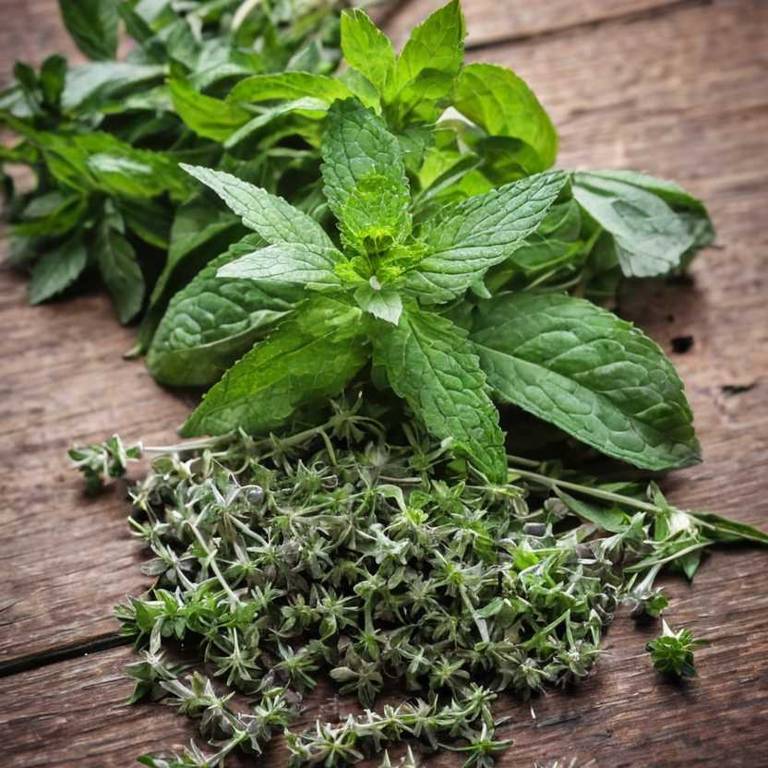By Leen Randell
Updated: Jul 06, 2024
10 Health Benefits Of Mentha Spicata (Spearmint)

Mentha spicata, also known as spearmint, has health benefits such as reducing digestive issues and alleviating nausea.
Its medicinal properties include its high menthone content, which has anti-inflammatory and antioxidant effects. The plant's ability to soothe digestive problems can help improve quality of life for those with irritable bowel syndrome, while its anti-inflammatory properties can aid in pain relief and reduce stress.
This can lead to improved sleep, increased productivity, and enhanced overall well-being.
This article explains in details the 10 best health benefits of Mentha spicata.
1. Reduces nausea and vomiting
Mentha spicata reduces nausea and vomiting because of its natural calming effects on the digestive system.
The herb's essential oils, particularly menthol and menthone, have been shown to relax the stomach muscles, reducing spasms and cramps that can lead to nausea and vomiting.
Additionally, spearmint's anti-inflammatory properties may help soothe the stomach lining, further alleviating symptoms of nausea and vomiting.
2. Soothes skin irritations
Mentha spicata soothes skin irritations because of its exceptional anti-inflammatory and antioxidant properties.
When applied topically, spearmint's essential oils reduce redness and swelling associated with skin irritations, such as acne, eczema, and minor cuts and scrapes.
Additionally, spearmint's antimicrobial properties help to prevent infection and promote wound healing, leaving the skin calm, clear, and refreshed.
3. Alleviates headaches
Mentha spicata alleviates headaches because it possesses a unique blend of compounds that target the root causes of migraines and tension headaches.
The menthol in spearmint oil helps to relax muscle tissue, reducing tension and pressure on the head and neck.
Additionally, its anti-inflammatory properties help to reduce inflammation and swelling in blood vessels, which can contribute to pain and discomfort.
4. Improves digestion
Mentha spicata improves digestion because of its unique combination of bioactive compounds that ease digestive discomfort.
The leaves and oils of spearmint contain rosmarinic acid, which has natural anti-inflammatory properties that help reduce inflammation in the gut and alleviate symptoms of irritable bowel syndrome (IBS).
Additionally, spearmint's essential oils have a calming effect on the muscles lining the digestive tract, reducing spasms and cramping, allowing for smoother digestion and relief from indigestion and bloating.
5. Relieves menstrual cramps
Mentha spicata relieves menstrual cramps because it contains compounds like menthol and methyleugenol that help to relax the uterine muscles and reduce inflammation.
The essential oils present in spearmint leaves have been shown to inhibit the production of prostaglandins, which are hormone-like substances that cause contractions during menstruation.
By reducing prostaglandin production, spearmint helps to alleviate cramps, making it a natural and effective remedy for menstrual relief.
6. Fights bad breath
Mentha spicata fights bad breath because of its potent antimicrobial properties.
The essential oils present in spearmint leaves have been shown to inhibit the growth of anaerobic bacteria that contribute to bad breath, or halitosis. Additionally, spearmint's antioxidant compounds help reduce inflammation in the mouth and throat, which can also contribute to unpleasant odors.
By combating these underlying causes, spearmint can leave your breath feeling fresh and clean.
7. Clears respiratory tract
Mentha spicata clears respiratory tract because of its inherent properties that soothe and calm the bronchial tubes.
The leaves of spearmint contain menthol, a natural expectorant that helps loosen mucus, making it easier to expel from the lungs.
Additionally, spearmint's anti-inflammatory compounds reduce swelling in the airways, allowing for smoother breathing and relieving congestion associated with colds, bronchitis, and other respiratory issues.
8. Reduces fever
Mentha spicata reduces fever because of its potent antimicrobial and anti-inflammatory properties.
The essential oils present in spearmint leaves, such as menthol and menthone, have been shown to inhibit the growth of bacteria and viruses that can cause fever.
Additionally, spearmint's cooling effect on the skin helps to reduce body temperature, providing relief from heat and discomfort associated with fever.
9. Slows down memory loss
Mentha spicata slows down memory loss because of its potent antioxidant and anti-inflammatory properties.
The essential oil extracted from its leaves, carvacrol, has been shown to inhibit the formation of amyloid plaques in the brain, a hallmark of Alzheimer's disease.
Additionally, spearmint's flavonoids improve blood flow to the brain, enhancing cognitive function and reducing oxidative stress, thereby slowing down memory loss and preserving mental clarity.
10. Inhibits growth of bacteria
Mentha spicata inhibits growth of bacteria because of its potent antimicrobial properties.
The essential oils present in spearmint leaves, particularly menthol and menthone, have been shown to exhibit antibacterial activity against various pathogenic microorganisms, including E. coli, Staphylococcus aureus, and Salmonella typhi.
This inhibition is thought to occur through disruption of bacterial cell membranes and interference with DNA replication.